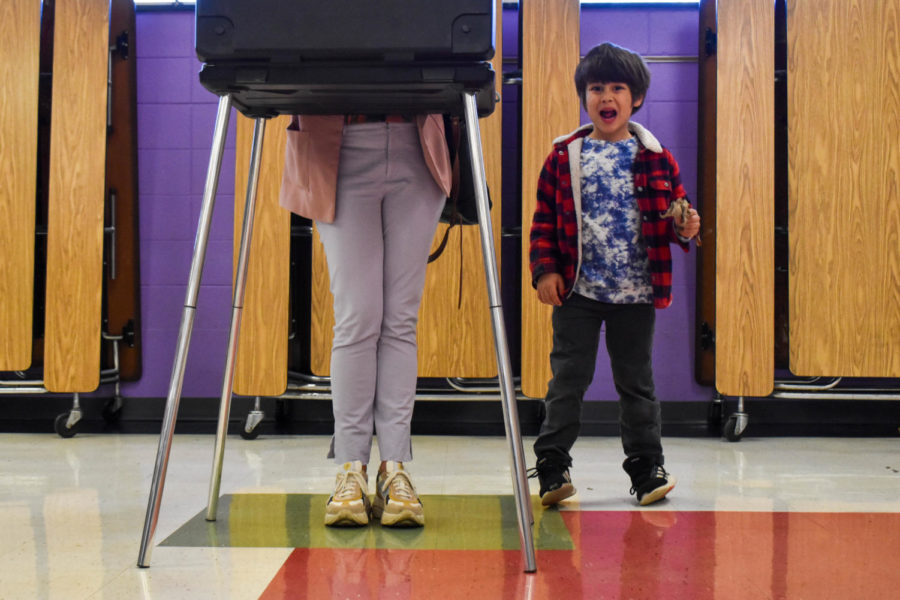What a defeat of Amendment 2 means for Kentucky
A voter fills out a ballot with her child on Tuesday, Nov. 8, 2022, at Maxwell Elementary School in Lexington, Kentucky. Photo by Abbey Cutrer | Kentucky Kernel
November 9, 2022
Early Wednesday morning, the proposed amendment to declare abortion not protected by the Kentucky constitution was defeated.
The Associated Press called the race Wednesday morning after 86% of votes had been counted, with 53% of voters against the amendment and 47% in favor.
Opponents of the recently imposed abortion bans in Kentucky will now be able to continue their legal fight against the restrictions.
Voting on Amendment 2 gave Kentuckians a say in whether or not abortion should be protected under the Kentucky Constitution. The proposed amendment states “To protect human life, nothing in this Constitution shall be construed to secure or protect a right to abortion or require the funding of abortion.”
A vote “yes” supported amending the Kentucky Constitution to clarify that nothing within it creates the right to an abortion.
A majority “yes” outcome would have meant those trying to secure the abortion ban in Kentucky could not be argued against using the state’s Constitution and due to the overturning of Roe v. Wade could not be argued against using the federal Constitution either.
This outcome likely would have put an end to the legal challenges seeking to overturn abortion bans.
A vote “no” opposed amending the Kentucky Constitution, leaving abortion laws open to be challenged using the Kentucky Constitutional rights to privacy, bodily autonomy, and self-determination.
Yes for Life ran the leading campaign for Amendment 2. They predicted a win, believing Kentucky to be among the most pro-life states in the nation.
Protect Kentucky Access, the opposing campaign of Amendment 2, believed the amendment was too restrictive and that current laws banning abortion even in the cases of rape, incest or fetal anomalies should be combated.
The uproar of differences regarding abortion reached a fever pitch on June 24, 2022 when the U.S. Supreme Court overturned Roe v. Wade, the piece of legislation that made access to an abortion a federal right in America.
This decision opened the doors for states to make their own determinations regarding abortion regulation. This year saw six ballot measures addressing abortion – the most on record in a single year.
In Kentucky’s case, former Governor Matt Bevin signed a trigger law in 2019, which is a law that wasn’t enforceable upon being passed but was seeking one key factor to change. The overturning of Roe v. Wade caused that law to be immediately enacted.
Titled the “Human Life Protection Act,” House Bill 148 banned abortion unless the procedure was deemed “necessary in reasonable medical judgment to prevent the death or substantial risk of death due to a physical condition, or to prevent the serious, permanent impairment of a life-sustaining organ of a pregnant woman.”
This led to backlash from Planned Parenthood, the EMW Women’s Surgical Center and the American Civil Liberties Union (ACLU). The ACLU and the EMW Womens Surgical Center filed a lawsuit arguing that reproductive health care, including abortion for any reason, is a right protected by the Kentucky Constitution due to its expressed rights to “privacy, bodily autonomy, and self-determination,” according to Ballotpedia.
Additionally, the Kentucky Supreme Court found a “substantial likelihood that these laws violate the rights to privacy and self-determination” within the Kentucky Constitution as it currently stood in result of the ACLU lawsuit.
Jefferson Circuit Judge Mitch Perry ruled in favor of abortion rights, issuing a temporary injunction against Kentucky’s trigger law.
Attorney General Daniel Cameron continued to fight for the banning of abortion, claiming, “a right to abortion is not grounded in the text and history of our state’s governing document.” He appealed Perry’s order, and the case is currently pending.
Defeat of the amendment means pro-choice supporters will continue to fight in the Kentucky Supreme Court for the total legalization or lesser-restriction of abortion.
































































































































































